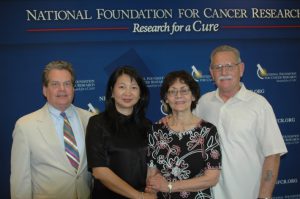Meet Carmen Rice: A Courageous and Inspirational GBM Survivor
This year marks the 13th anniversary of Carmen Rice’s survival from Glioblastoma Multiforme (GBM) – the deadliest brain cancer that is widely regarded as incurable and universally fatal. GBM kills 91% of patients within three years of diagnosis and NFCR is part of a robust, international coalition working on innovative ways to research the disease. In the cancer research world, too often stories do not have optimistic endings, which is why our work continues until we find cures. Yet Carmen’s thirteen-year survival is nothing less than miraculous and we are truly honored to share her incredible story with you.
Carmen’s Story
In 2004, Carmen Rice began experiencing severe headaches, nausea and dizziness. She remembers having lunch in a local restaurant and a moment later waking up in the hospital bed not knowing what happened or how she got there. She had a grand mal seizure. Scans revealed a small brain tumor. Days later, Carmen underwent brain surgery to remove the tumor.
The tumor removed proved to be GBM, a very aggressive, malignant tumor. Carmen was told she had only six months to live. Terrified, yet determined to beat this, she began an aggressive treatment regimen of radiation and chemotherapy.

(Left to Right) NFCR CEO Franklin C. Salisbury, Jr., NFCR President Dr. Sujuan Ba, Carmen Rice and Darrell Rice.
Fast forward to today, Carmen continues to live a happy, healthy and active life. She enjoys every moment and is an enthusiastic speaker within the cancer community, inspiring others with her positive outlook and message of hope. Carmen talks about how grateful she is to NFCR for the groundbreaking research done in the GBM field.
In her latest speech about her survival story, Carmen passionately discussed NFCR and her support of our work – specifically GBM AGILE. Carmen is confident – as are we – that together we will find a cure for GBM.
Today’s Research Will Lead to Tomorrow’s Cures
GBM AGILE
Led by the best and brightest cancer researchers, GBM AGILE is a revolutionary global collaboration to test and develop new brain cancer treatments. Its personalized approach will allow us to accelerate the discovery of targeted treatments for individual patients.
This global coalition has attracted over 150 participants from more than 40 leading cancer institutions across three continents. It implements a new generation of clinical trials – called “adaptive trials” – which allow patients to be enrolled more quickly, receive treatment with multiple anti-cancer drugs simultaneously and does not require years of follow-up to determine whether a new experimental treatment is beneficial. This revolutionary approach accelerates research for curing the aggressive form of cancer GBM and will serve as a new clinical research model for combating other cancers as well. As a founding member of the coalition, NFCR has continued to take a leading role in this unprecedented effort. It is anticipated that patient enrollment may start in the fall of 2017. Stayed tuned!











